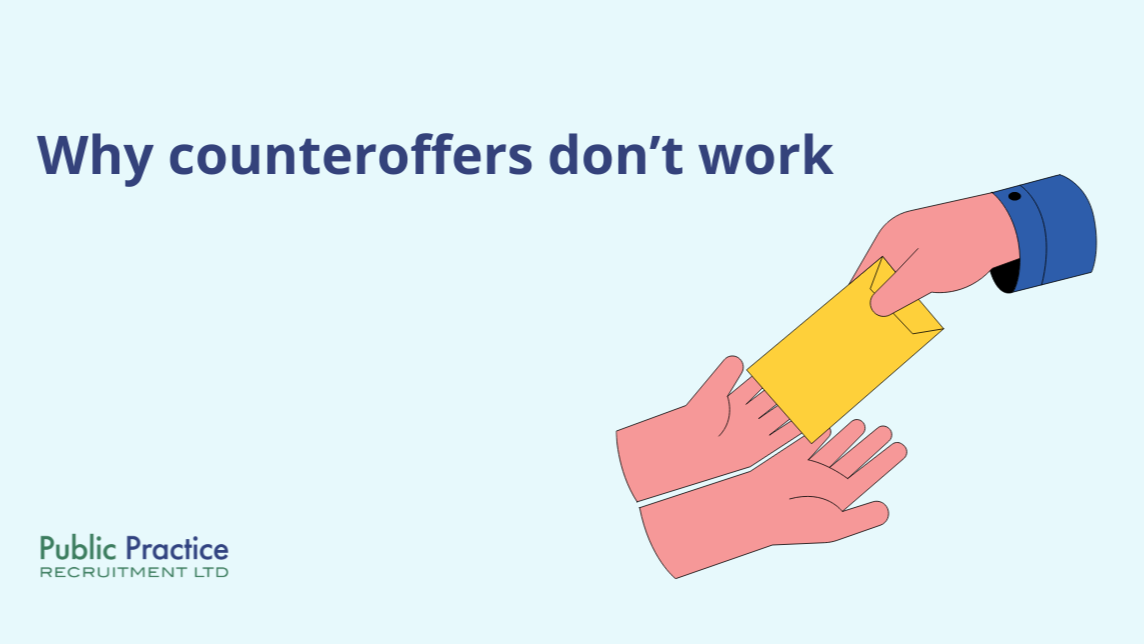
Why you shouldn't accept a counteroffer
Public Practice Recruitment Ltd - Experts in Public Practice Accountancy Recruitment UK-Wide
Recruiting into Accountancy Firms UK-Wide at all levels from Equity Partner to Semi-Senior. Superb, proven track record.
So, you’ve gone through the process of searching for a job, sending your CV, and interviewing.
You’re offered a job and you tell your current employer.
But what happens if they present a counteroffer?
For many accountancy firms, the ongoing skills shortage is still impacting recruitment drives and a lot of focus is being placed on talent retention. The prospect of recruiting to replace an employee who has resigned will be challenging for hiring managers who are already feeling the pressure, and as such, a counteroffer may be provided to tempt the employee into staying at the firm.
But, do counteroffers work? What is the long term impact on relationships? And does it solve the underlying issues?
In this week’s blog, we’re sharing our thoughts and exploring why, from extensive experience working closely with candidates and accountancy practices, we think you shouldn’t accept a counteroffer.
The underlying issues
Is your current role lacking variety or flexibility? Or perhaps you’re career minded without progression in sight?
It’s important to really think about what reasons have led you to search for a new job and to consider if these issues would be resolved by a counteroffer. Have you expressed concerns previously that you believe haven’t been resolved? Or do you feel like you can’t communicate openly and honestly with your current Line Manager? Either way, there are underlying issues at play which are significant enough to consider ending your current employment.
If you’ve raised concerns that haven’t yet been resolved, you might believe that the prospect of you leaving would encourage your employer to make the changes you’re hoping for. On the other hand, if you feel like you can’t share your thoughts prior to handing in your notice, there could be issues with management styles or workplace culture.
Ultimately, is accepting a counteroffer the solution to these underlying issues? Will it resolve your original concerns or will these resurface later down the line?
According to statistics, around 50% of employees who accept a counteroffer leave for a new job within 12 months.
Relationships and loyalty
So, you told your employer that you want to resign, but they presented a counteroffer and you accepted it. Do things go back to how they were?
The truth of it is, your employer now knows that you weren’t satisfied in your role. Whether you believe you deserve a higher salary, better benefits, more variety in your duties, or perhaps a more defined route to progression.
There’s a variety of reasons why you might want to change jobs, and even if the counteroffer initially addresses your concerns or wants, is it simply delaying your resignation?
It’s unlikely that things would return to an even keel and your loyalty will be thrown into question. Your employer will be wondering if you’re likely to look for a better offer elsewhere again and if you’ll truly be satisfied by the counteroffer. The business will also need to consider the impact this uncertainty will have on the firm’s ability to plan for the future.
Let’s take a look at the numbers.
A study of hiring managers revealed that most use a counteroffer as a retention tool and see it as a short-term cure for a long-term problem.
It is also reported that counteroffers set a bad precedent, with 34% of managers saying it damages employee trust and 30% believing it negatively impacts employee morale.
Career impact
This combination of doubt around loyalty and the uncertainty it creates for business planning could lead to a significant impact on your future career. Whilst a counteroffer might seem tempting, as resolutions to the immediate issues may be promised, it could ultimately slow down your professional development and career progression.
In fact, we've noticed a recent trend of accountants moving to smaller firms in pursuit of a more balanced and rewarding career.
Professional development is an investment made by your employer to strengthen its workforce as to provide the best possible service to clients. If your employer believes you might look elsewhere again, this could make them question whether providing further training opportunities is a good financial investment.
This also applies to career progression, where promoting an employee whose loyalty has been questioned could be seen as a poor investment for the company. Other employees who haven’t sought other opportunities and accepted a counteroffer may be preferable for promotions, meaning your route to progression is hindered.
With nearly 40% of HR leaders believing that accepting a counteroffer will adversely affect one’s career, this decision can be a big hit for career-driven candidates who want to build a progressive career.
Want to work for a firm that offers progression, reward and security?
Here at Public Practice Recruitment Ltd, we work closely with talented candidates and ambitious firms up and down the country, and we’ve seen first-hand the recruitment challenges that are impacting both sides.
As specialists in recruiting accountants into practice, we know the implications a counteroffer could have and we’ve worked with many candidates who have accepted a counteroffer but returned to us to find a new role only a short time later.
"It can be tempting to accept a counteroffer from your current employer, especially if you had some hesitations around leaving, but from our experience, candidates are much better off when they accept a new opportunity. Whilst the easy option might be to stick with what you know, the better step for your career is to find a role that provides a market-leading salary, benefits that work for you, and a route to progression that aligns with your career goals. And that’s where we can help. We’re working with some forward-thinking firms that are keen to secure talented candidates, like you, so don’t hesitate to contact the team today." - Garry Howling, Managing Director